Vodafone: Analysis of Leadership and Operational Management
VerifiedAdded on 2020/11/12
|12
|3542
|58
Report
AI Summary
This report provides an in-depth analysis of operational management and leadership within Vodafone, a telecommunications company. It begins by comparing the roles and characteristics of managers and leaders, highlighting their distinct responsibilities and styles. The report then examines how these roles are applied in different situational contexts, particularly addressing the issue of high employee turnover. It explores various leadership theories, including contingency, systems, and situational leadership, and their application within the company. Furthermore, the report details key approaches to operational management, emphasizing the roles of leaders and managers in these processes. It also explains the importance and value of operational management in achieving Vodafone's business objectives. Finally, the report discusses factors within the business environment that impact operational management and decision-making by leaders and managers, providing a comprehensive overview of leadership and operational strategies within the company.
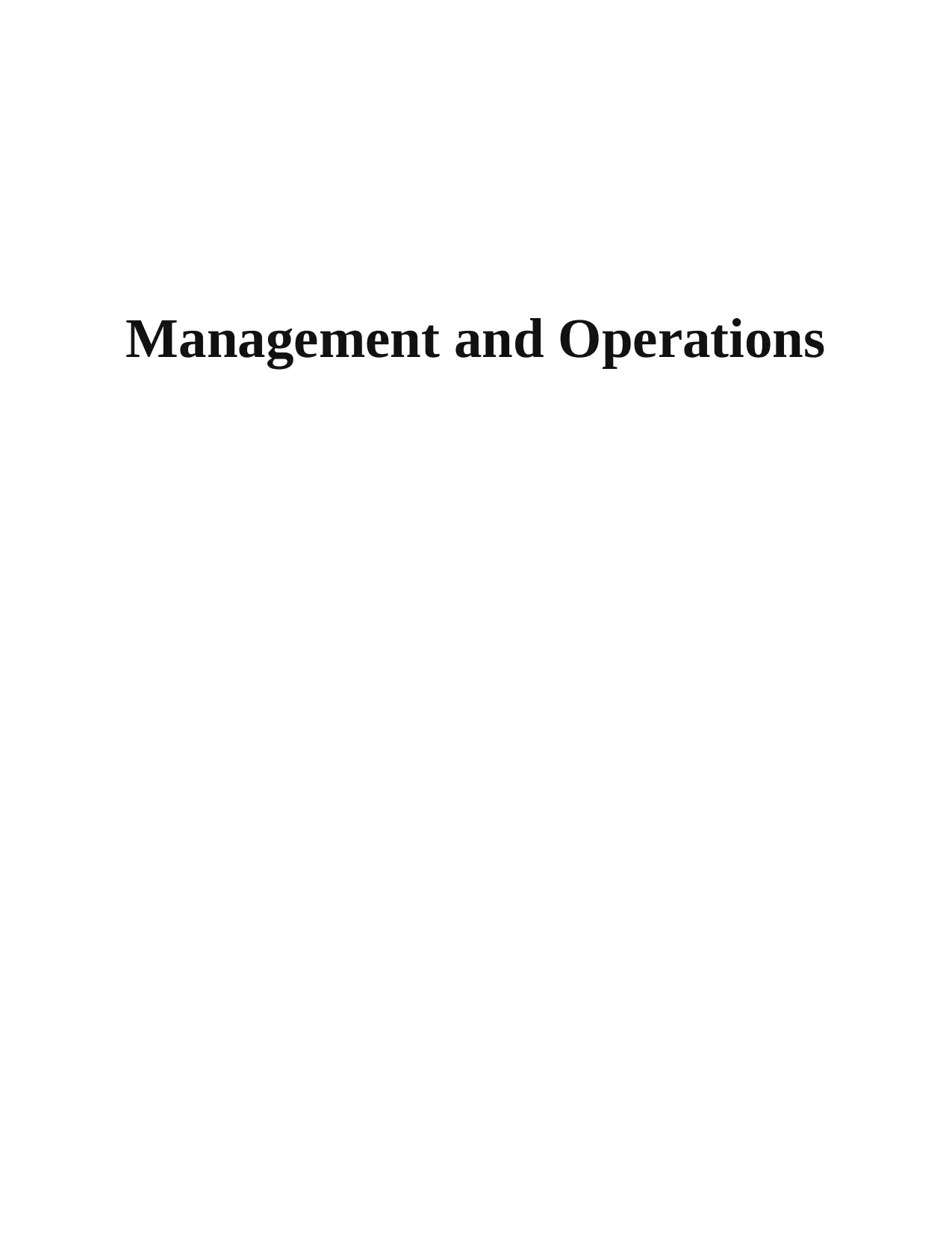
Management and Operations
Paraphrase This Document
Need a fresh take? Get an instant paraphrase of this document with our AI Paraphraser
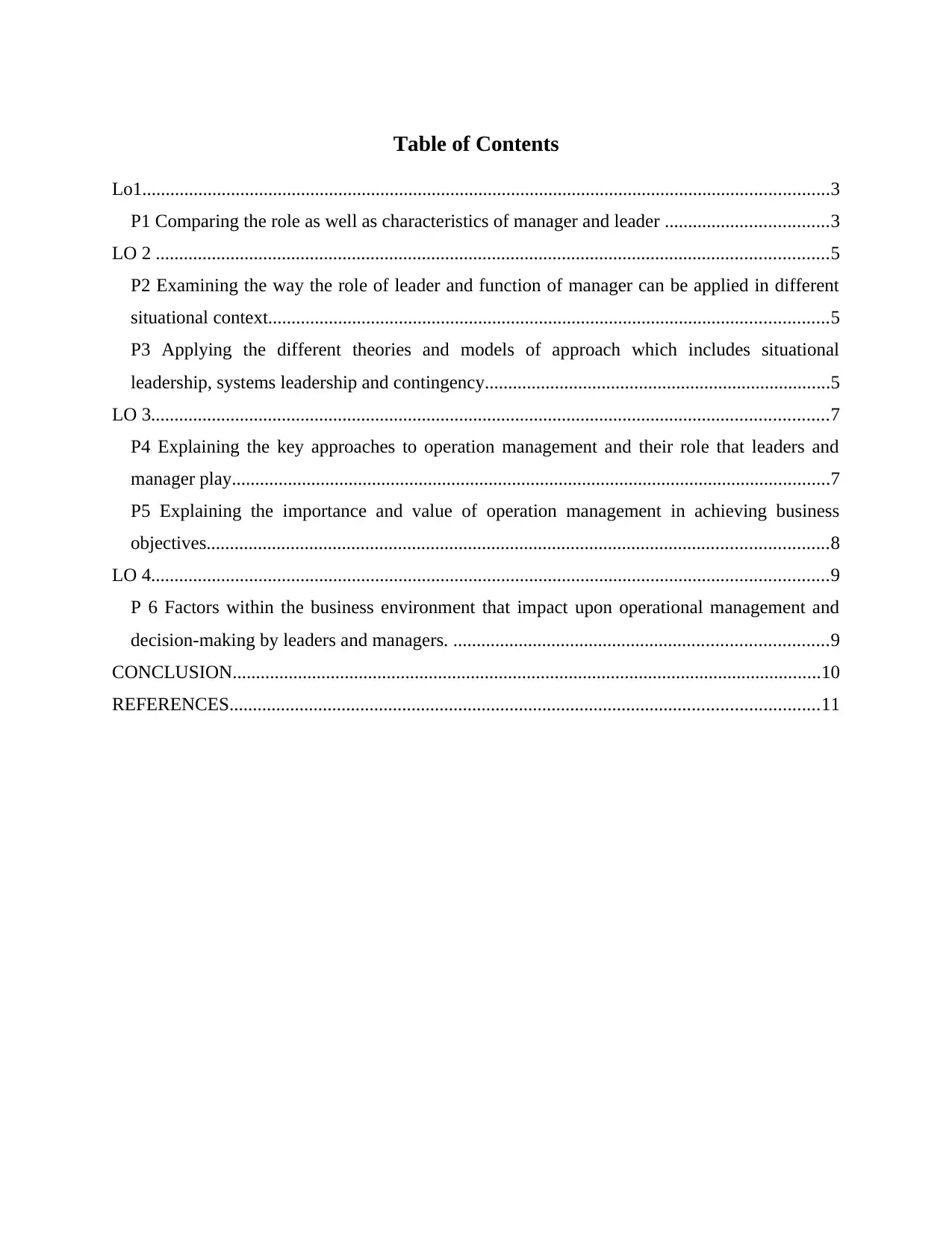
Table of Contents
Lo1...................................................................................................................................................3
P1 Comparing the role as well as characteristics of manager and leader ...................................3
LO 2 ................................................................................................................................................5
P2 Examining the way the role of leader and function of manager can be applied in different
situational context........................................................................................................................5
P3 Applying the different theories and models of approach which includes situational
leadership, systems leadership and contingency..........................................................................5
LO 3.................................................................................................................................................7
P4 Explaining the key approaches to operation management and their role that leaders and
manager play................................................................................................................................7
P5 Explaining the importance and value of operation management in achieving business
objectives.....................................................................................................................................8
LO 4.................................................................................................................................................9
P 6 Factors within the business environment that impact upon operational management and
decision-making by leaders and managers. ................................................................................9
CONCLUSION..............................................................................................................................10
REFERENCES..............................................................................................................................11
Lo1...................................................................................................................................................3
P1 Comparing the role as well as characteristics of manager and leader ...................................3
LO 2 ................................................................................................................................................5
P2 Examining the way the role of leader and function of manager can be applied in different
situational context........................................................................................................................5
P3 Applying the different theories and models of approach which includes situational
leadership, systems leadership and contingency..........................................................................5
LO 3.................................................................................................................................................7
P4 Explaining the key approaches to operation management and their role that leaders and
manager play................................................................................................................................7
P5 Explaining the importance and value of operation management in achieving business
objectives.....................................................................................................................................8
LO 4.................................................................................................................................................9
P 6 Factors within the business environment that impact upon operational management and
decision-making by leaders and managers. ................................................................................9
CONCLUSION..............................................................................................................................10
REFERENCES..............................................................................................................................11
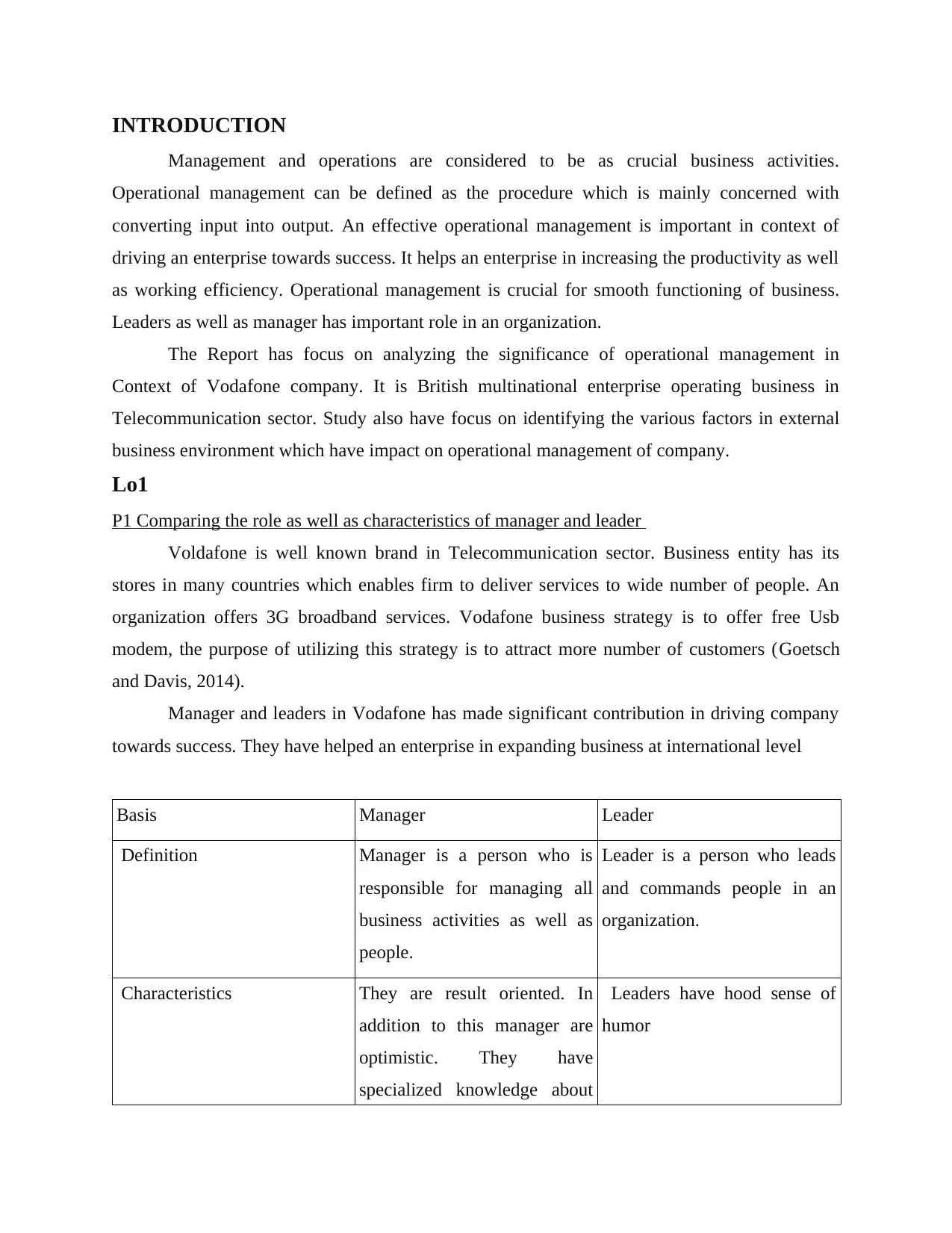
INTRODUCTION
Management and operations are considered to be as crucial business activities.
Operational management can be defined as the procedure which is mainly concerned with
converting input into output. An effective operational management is important in context of
driving an enterprise towards success. It helps an enterprise in increasing the productivity as well
as working efficiency. Operational management is crucial for smooth functioning of business.
Leaders as well as manager has important role in an organization.
The Report has focus on analyzing the significance of operational management in
Context of Vodafone company. It is British multinational enterprise operating business in
Telecommunication sector. Study also have focus on identifying the various factors in external
business environment which have impact on operational management of company.
Lo1
P1 Comparing the role as well as characteristics of manager and leader
Voldafone is well known brand in Telecommunication sector. Business entity has its
stores in many countries which enables firm to deliver services to wide number of people. An
organization offers 3G broadband services. Vodafone business strategy is to offer free Usb
modem, the purpose of utilizing this strategy is to attract more number of customers (Goetsch
and Davis, 2014).
Manager and leaders in Vodafone has made significant contribution in driving company
towards success. They have helped an enterprise in expanding business at international level
Basis Manager Leader
Definition Manager is a person who is
responsible for managing all
business activities as well as
people.
Leader is a person who leads
and commands people in an
organization.
Characteristics They are result oriented. In
addition to this manager are
optimistic. They have
specialized knowledge about
Leaders have hood sense of
humor
Management and operations are considered to be as crucial business activities.
Operational management can be defined as the procedure which is mainly concerned with
converting input into output. An effective operational management is important in context of
driving an enterprise towards success. It helps an enterprise in increasing the productivity as well
as working efficiency. Operational management is crucial for smooth functioning of business.
Leaders as well as manager has important role in an organization.
The Report has focus on analyzing the significance of operational management in
Context of Vodafone company. It is British multinational enterprise operating business in
Telecommunication sector. Study also have focus on identifying the various factors in external
business environment which have impact on operational management of company.
Lo1
P1 Comparing the role as well as characteristics of manager and leader
Voldafone is well known brand in Telecommunication sector. Business entity has its
stores in many countries which enables firm to deliver services to wide number of people. An
organization offers 3G broadband services. Vodafone business strategy is to offer free Usb
modem, the purpose of utilizing this strategy is to attract more number of customers (Goetsch
and Davis, 2014).
Manager and leaders in Vodafone has made significant contribution in driving company
towards success. They have helped an enterprise in expanding business at international level
Basis Manager Leader
Definition Manager is a person who is
responsible for managing all
business activities as well as
people.
Leader is a person who leads
and commands people in an
organization.
Characteristics They are result oriented. In
addition to this manager are
optimistic. They have
specialized knowledge about
Leaders have hood sense of
humor
⊘ This is a preview!⊘
Do you want full access?
Subscribe today to unlock all pages.

Trusted by 1+ million students worldwide
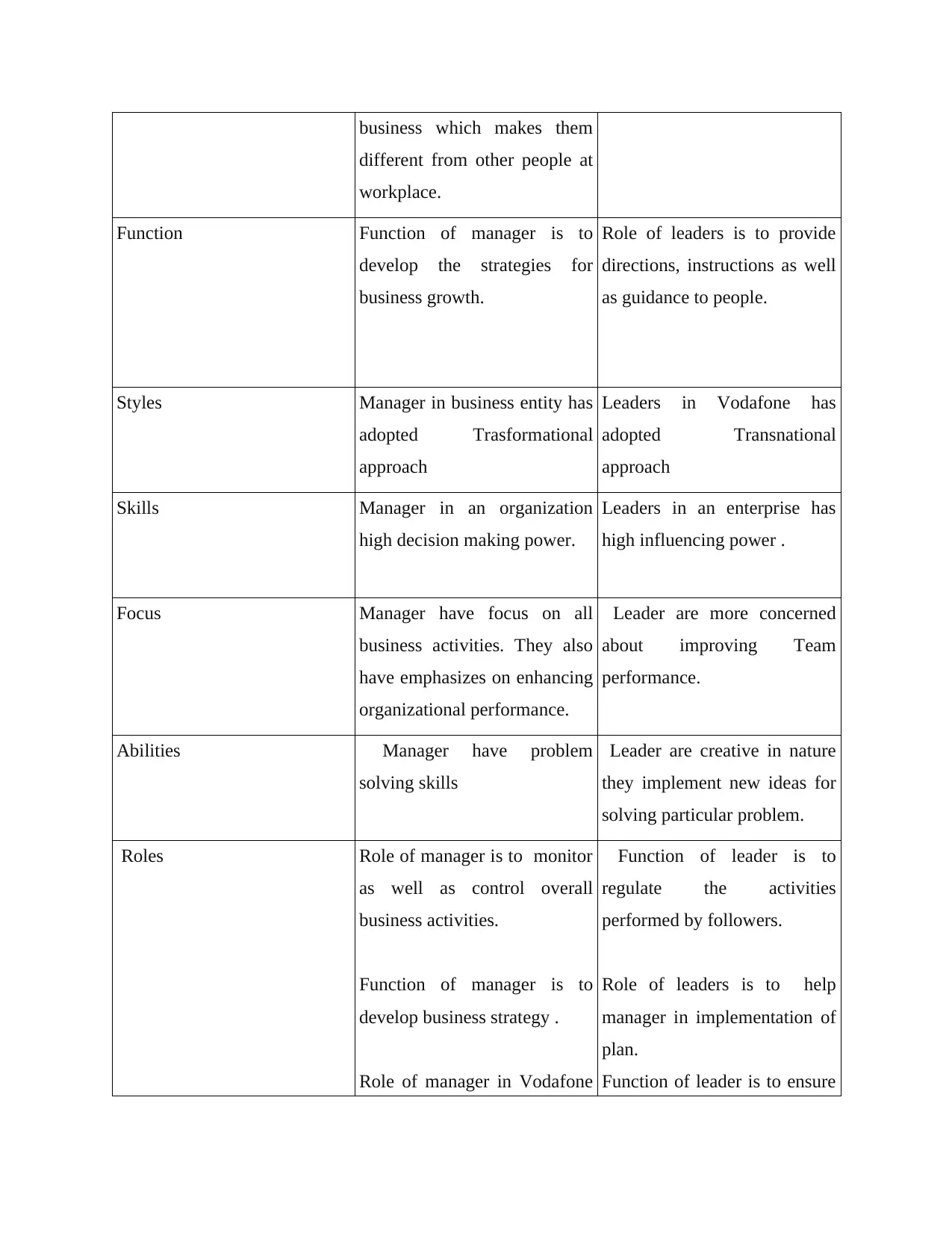
business which makes them
different from other people at
workplace.
Function Function of manager is to
develop the strategies for
business growth.
Role of leaders is to provide
directions, instructions as well
as guidance to people.
Styles Manager in business entity has
adopted Trasformational
approach
Leaders in Vodafone has
adopted Transnational
approach
Skills Manager in an organization
high decision making power.
Leaders in an enterprise has
high influencing power .
Focus Manager have focus on all
business activities. They also
have emphasizes on enhancing
organizational performance.
Leader are more concerned
about improving Team
performance.
Abilities Manager have problem
solving skills
Leader are creative in nature
they implement new ideas for
solving particular problem.
Roles Role of manager is to monitor
as well as control overall
business activities.
Function of manager is to
develop business strategy .
Role of manager in Vodafone
Function of leader is to
regulate the activities
performed by followers.
Role of leaders is to help
manager in implementation of
plan.
Function of leader is to ensure
different from other people at
workplace.
Function Function of manager is to
develop the strategies for
business growth.
Role of leaders is to provide
directions, instructions as well
as guidance to people.
Styles Manager in business entity has
adopted Trasformational
approach
Leaders in Vodafone has
adopted Transnational
approach
Skills Manager in an organization
high decision making power.
Leaders in an enterprise has
high influencing power .
Focus Manager have focus on all
business activities. They also
have emphasizes on enhancing
organizational performance.
Leader are more concerned
about improving Team
performance.
Abilities Manager have problem
solving skills
Leader are creative in nature
they implement new ideas for
solving particular problem.
Roles Role of manager is to monitor
as well as control overall
business activities.
Function of manager is to
develop business strategy .
Role of manager in Vodafone
Function of leader is to
regulate the activities
performed by followers.
Role of leaders is to help
manager in implementation of
plan.
Function of leader is to ensure
Paraphrase This Document
Need a fresh take? Get an instant paraphrase of this document with our AI Paraphraser
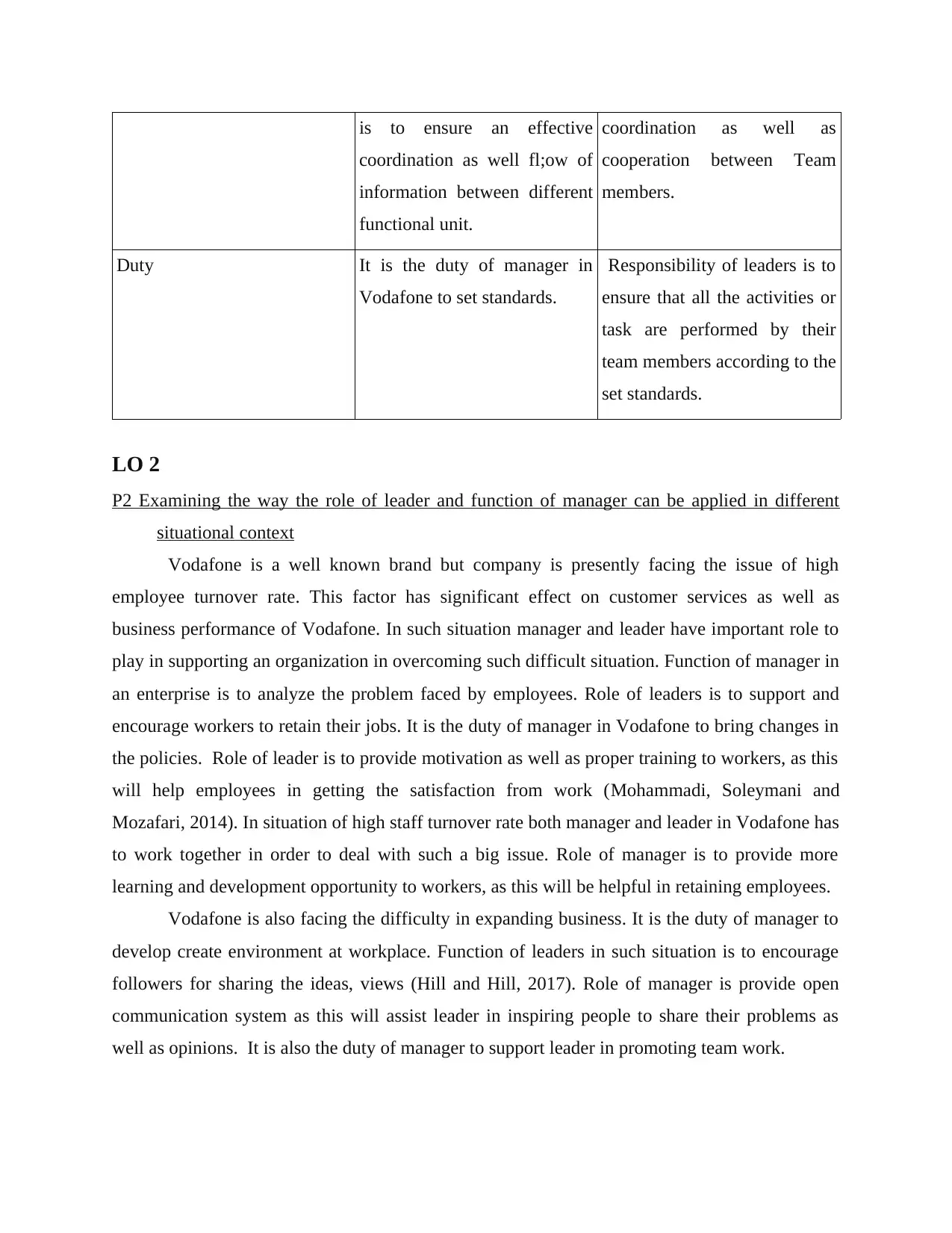
is to ensure an effective
coordination as well fl;ow of
information between different
functional unit.
coordination as well as
cooperation between Team
members.
Duty It is the duty of manager in
Vodafone to set standards.
Responsibility of leaders is to
ensure that all the activities or
task are performed by their
team members according to the
set standards.
LO 2
P2 Examining the way the role of leader and function of manager can be applied in different
situational context
Vodafone is a well known brand but company is presently facing the issue of high
employee turnover rate. This factor has significant effect on customer services as well as
business performance of Vodafone. In such situation manager and leader have important role to
play in supporting an organization in overcoming such difficult situation. Function of manager in
an enterprise is to analyze the problem faced by employees. Role of leaders is to support and
encourage workers to retain their jobs. It is the duty of manager in Vodafone to bring changes in
the policies. Role of leader is to provide motivation as well as proper training to workers, as this
will help employees in getting the satisfaction from work (Mohammadi, Soleymani and
Mozafari, 2014). In situation of high staff turnover rate both manager and leader in Vodafone has
to work together in order to deal with such a big issue. Role of manager is to provide more
learning and development opportunity to workers, as this will be helpful in retaining employees.
Vodafone is also facing the difficulty in expanding business. It is the duty of manager to
develop create environment at workplace. Function of leaders in such situation is to encourage
followers for sharing the ideas, views (Hill and Hill, 2017). Role of manager is provide open
communication system as this will assist leader in inspiring people to share their problems as
well as opinions. It is also the duty of manager to support leader in promoting team work.
coordination as well fl;ow of
information between different
functional unit.
coordination as well as
cooperation between Team
members.
Duty It is the duty of manager in
Vodafone to set standards.
Responsibility of leaders is to
ensure that all the activities or
task are performed by their
team members according to the
set standards.
LO 2
P2 Examining the way the role of leader and function of manager can be applied in different
situational context
Vodafone is a well known brand but company is presently facing the issue of high
employee turnover rate. This factor has significant effect on customer services as well as
business performance of Vodafone. In such situation manager and leader have important role to
play in supporting an organization in overcoming such difficult situation. Function of manager in
an enterprise is to analyze the problem faced by employees. Role of leaders is to support and
encourage workers to retain their jobs. It is the duty of manager in Vodafone to bring changes in
the policies. Role of leader is to provide motivation as well as proper training to workers, as this
will help employees in getting the satisfaction from work (Mohammadi, Soleymani and
Mozafari, 2014). In situation of high staff turnover rate both manager and leader in Vodafone has
to work together in order to deal with such a big issue. Role of manager is to provide more
learning and development opportunity to workers, as this will be helpful in retaining employees.
Vodafone is also facing the difficulty in expanding business. It is the duty of manager to
develop create environment at workplace. Function of leaders in such situation is to encourage
followers for sharing the ideas, views (Hill and Hill, 2017). Role of manager is provide open
communication system as this will assist leader in inspiring people to share their problems as
well as opinions. It is also the duty of manager to support leader in promoting team work.
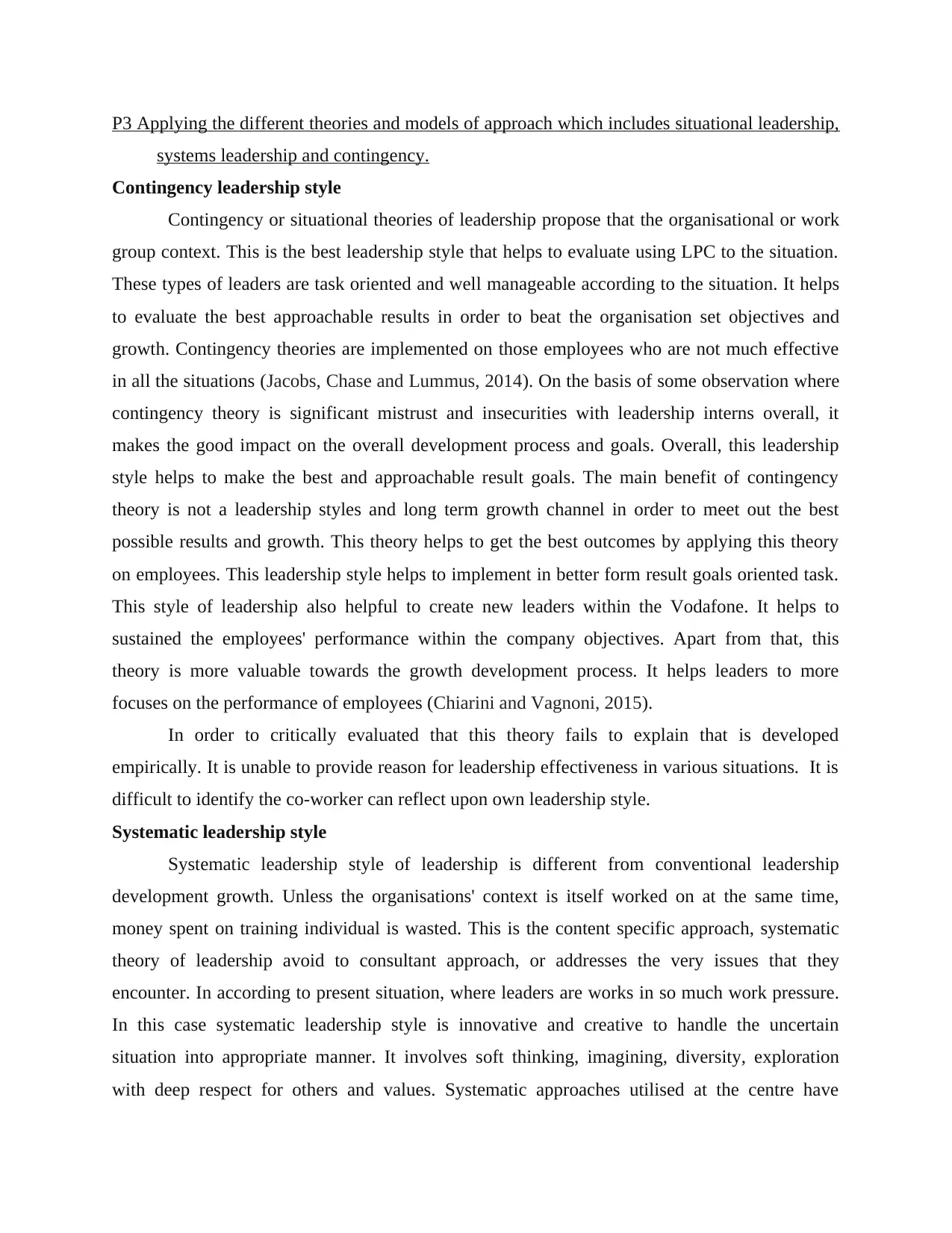
P3 Applying the different theories and models of approach which includes situational leadership,
systems leadership and contingency.
Contingency leadership style
Contingency or situational theories of leadership propose that the organisational or work
group context. This is the best leadership style that helps to evaluate using LPC to the situation.
These types of leaders are task oriented and well manageable according to the situation. It helps
to evaluate the best approachable results in order to beat the organisation set objectives and
growth. Contingency theories are implemented on those employees who are not much effective
in all the situations (Jacobs, Chase and Lummus, 2014). On the basis of some observation where
contingency theory is significant mistrust and insecurities with leadership interns overall, it
makes the good impact on the overall development process and goals. Overall, this leadership
style helps to make the best and approachable result goals. The main benefit of contingency
theory is not a leadership styles and long term growth channel in order to meet out the best
possible results and growth. This theory helps to get the best outcomes by applying this theory
on employees. This leadership style helps to implement in better form result goals oriented task.
This style of leadership also helpful to create new leaders within the Vodafone. It helps to
sustained the employees' performance within the company objectives. Apart from that, this
theory is more valuable towards the growth development process. It helps leaders to more
focuses on the performance of employees (Chiarini and Vagnoni, 2015).
In order to critically evaluated that this theory fails to explain that is developed
empirically. It is unable to provide reason for leadership effectiveness in various situations. It is
difficult to identify the co-worker can reflect upon own leadership style.
Systematic leadership style
Systematic leadership style of leadership is different from conventional leadership
development growth. Unless the organisations' context is itself worked on at the same time,
money spent on training individual is wasted. This is the content specific approach, systematic
theory of leadership avoid to consultant approach, or addresses the very issues that they
encounter. In according to present situation, where leaders are works in so much work pressure.
In this case systematic leadership style is innovative and creative to handle the uncertain
situation into appropriate manner. It involves soft thinking, imagining, diversity, exploration
with deep respect for others and values. Systematic approaches utilised at the centre have
systems leadership and contingency.
Contingency leadership style
Contingency or situational theories of leadership propose that the organisational or work
group context. This is the best leadership style that helps to evaluate using LPC to the situation.
These types of leaders are task oriented and well manageable according to the situation. It helps
to evaluate the best approachable results in order to beat the organisation set objectives and
growth. Contingency theories are implemented on those employees who are not much effective
in all the situations (Jacobs, Chase and Lummus, 2014). On the basis of some observation where
contingency theory is significant mistrust and insecurities with leadership interns overall, it
makes the good impact on the overall development process and goals. Overall, this leadership
style helps to make the best and approachable result goals. The main benefit of contingency
theory is not a leadership styles and long term growth channel in order to meet out the best
possible results and growth. This theory helps to get the best outcomes by applying this theory
on employees. This leadership style helps to implement in better form result goals oriented task.
This style of leadership also helpful to create new leaders within the Vodafone. It helps to
sustained the employees' performance within the company objectives. Apart from that, this
theory is more valuable towards the growth development process. It helps leaders to more
focuses on the performance of employees (Chiarini and Vagnoni, 2015).
In order to critically evaluated that this theory fails to explain that is developed
empirically. It is unable to provide reason for leadership effectiveness in various situations. It is
difficult to identify the co-worker can reflect upon own leadership style.
Systematic leadership style
Systematic leadership style of leadership is different from conventional leadership
development growth. Unless the organisations' context is itself worked on at the same time,
money spent on training individual is wasted. This is the content specific approach, systematic
theory of leadership avoid to consultant approach, or addresses the very issues that they
encounter. In according to present situation, where leaders are works in so much work pressure.
In this case systematic leadership style is innovative and creative to handle the uncertain
situation into appropriate manner. It involves soft thinking, imagining, diversity, exploration
with deep respect for others and values. Systematic approaches utilised at the centre have
⊘ This is a preview!⊘
Do you want full access?
Subscribe today to unlock all pages.

Trusted by 1+ million students worldwide
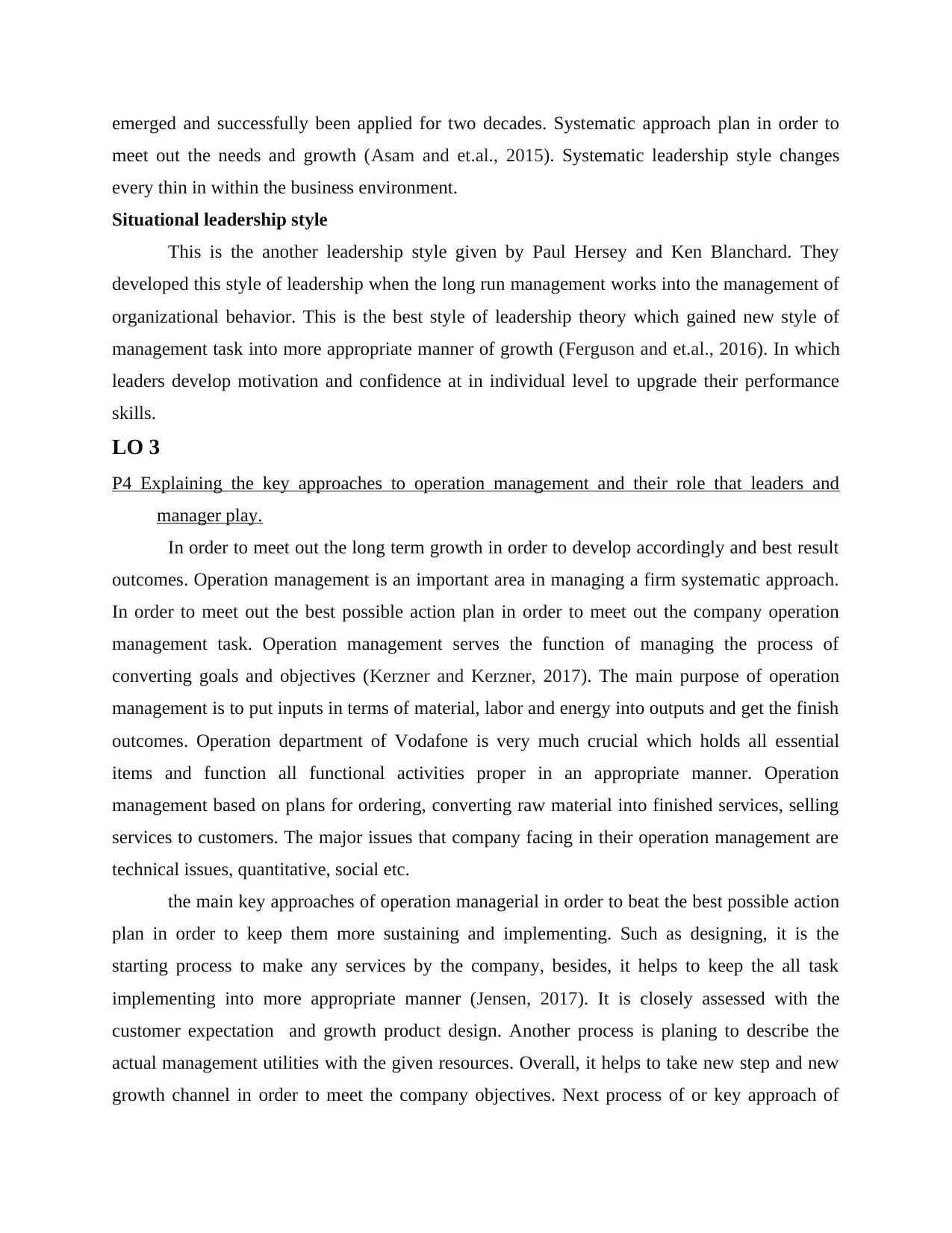
emerged and successfully been applied for two decades. Systematic approach plan in order to
meet out the needs and growth (Asam and et.al., 2015). Systematic leadership style changes
every thin in within the business environment.
Situational leadership style
This is the another leadership style given by Paul Hersey and Ken Blanchard. They
developed this style of leadership when the long run management works into the management of
organizational behavior. This is the best style of leadership theory which gained new style of
management task into more appropriate manner of growth (Ferguson and et.al., 2016). In which
leaders develop motivation and confidence at in individual level to upgrade their performance
skills.
LO 3
P4 Explaining the key approaches to operation management and their role that leaders and
manager play.
In order to meet out the long term growth in order to develop accordingly and best result
outcomes. Operation management is an important area in managing a firm systematic approach.
In order to meet out the best possible action plan in order to meet out the company operation
management task. Operation management serves the function of managing the process of
converting goals and objectives (Kerzner and Kerzner, 2017). The main purpose of operation
management is to put inputs in terms of material, labor and energy into outputs and get the finish
outcomes. Operation department of Vodafone is very much crucial which holds all essential
items and function all functional activities proper in an appropriate manner. Operation
management based on plans for ordering, converting raw material into finished services, selling
services to customers. The major issues that company facing in their operation management are
technical issues, quantitative, social etc.
the main key approaches of operation managerial in order to beat the best possible action
plan in order to keep them more sustaining and implementing. Such as designing, it is the
starting process to make any services by the company, besides, it helps to keep the all task
implementing into more appropriate manner (Jensen, 2017). It is closely assessed with the
customer expectation and growth product design. Another process is planing to describe the
actual management utilities with the given resources. Overall, it helps to take new step and new
growth channel in order to meet the company objectives. Next process of or key approach of
meet out the needs and growth (Asam and et.al., 2015). Systematic leadership style changes
every thin in within the business environment.
Situational leadership style
This is the another leadership style given by Paul Hersey and Ken Blanchard. They
developed this style of leadership when the long run management works into the management of
organizational behavior. This is the best style of leadership theory which gained new style of
management task into more appropriate manner of growth (Ferguson and et.al., 2016). In which
leaders develop motivation and confidence at in individual level to upgrade their performance
skills.
LO 3
P4 Explaining the key approaches to operation management and their role that leaders and
manager play.
In order to meet out the long term growth in order to develop accordingly and best result
outcomes. Operation management is an important area in managing a firm systematic approach.
In order to meet out the best possible action plan in order to meet out the company operation
management task. Operation management serves the function of managing the process of
converting goals and objectives (Kerzner and Kerzner, 2017). The main purpose of operation
management is to put inputs in terms of material, labor and energy into outputs and get the finish
outcomes. Operation department of Vodafone is very much crucial which holds all essential
items and function all functional activities proper in an appropriate manner. Operation
management based on plans for ordering, converting raw material into finished services, selling
services to customers. The major issues that company facing in their operation management are
technical issues, quantitative, social etc.
the main key approaches of operation managerial in order to beat the best possible action
plan in order to keep them more sustaining and implementing. Such as designing, it is the
starting process to make any services by the company, besides, it helps to keep the all task
implementing into more appropriate manner (Jensen, 2017). It is closely assessed with the
customer expectation and growth product design. Another process is planing to describe the
actual management utilities with the given resources. Overall, it helps to take new step and new
growth channel in order to meet the company objectives. Next process of or key approach of
Paraphrase This Document
Need a fresh take? Get an instant paraphrase of this document with our AI Paraphraser
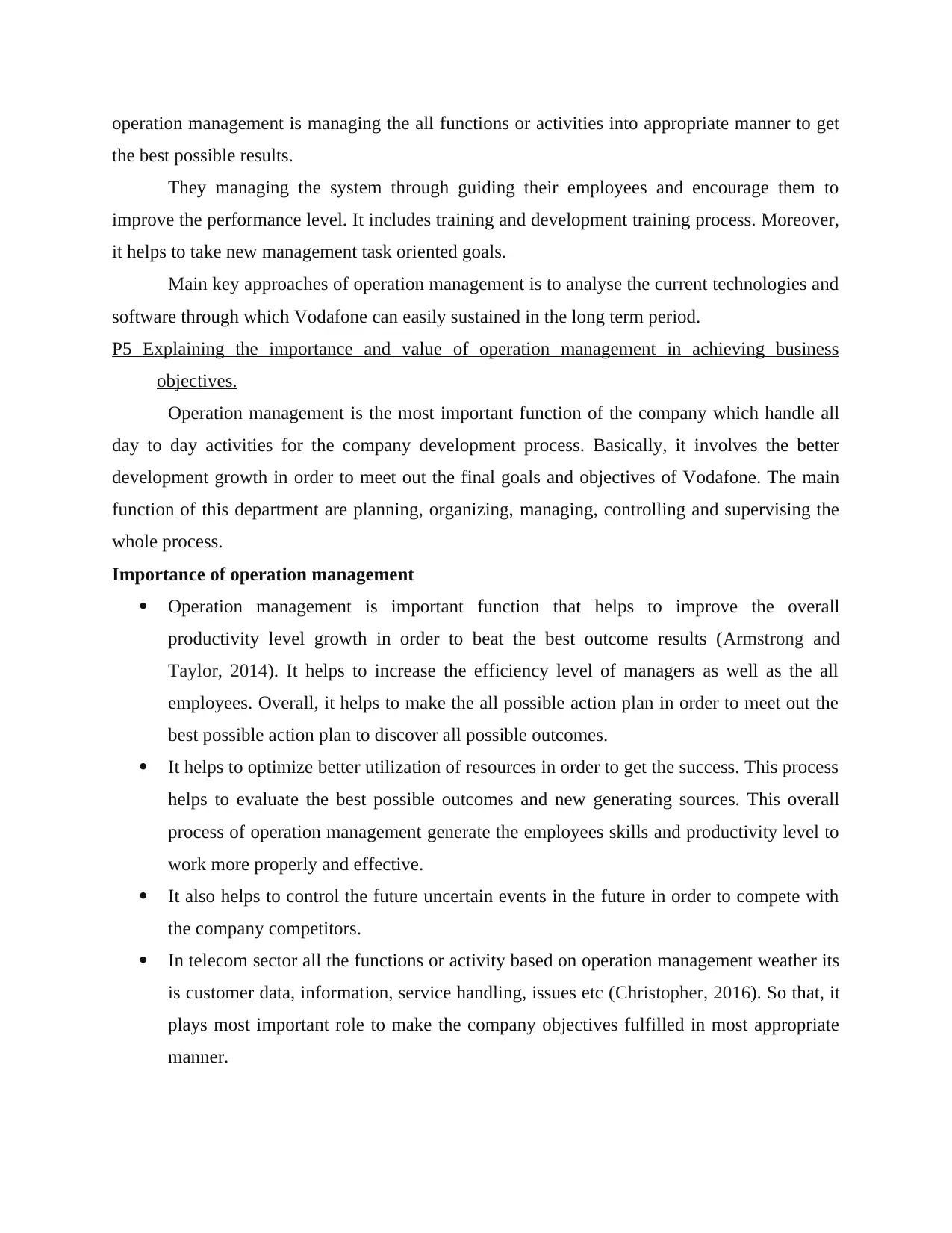
operation management is managing the all functions or activities into appropriate manner to get
the best possible results.
They managing the system through guiding their employees and encourage them to
improve the performance level. It includes training and development training process. Moreover,
it helps to take new management task oriented goals.
Main key approaches of operation management is to analyse the current technologies and
software through which Vodafone can easily sustained in the long term period.
P5 Explaining the importance and value of operation management in achieving business
objectives.
Operation management is the most important function of the company which handle all
day to day activities for the company development process. Basically, it involves the better
development growth in order to meet out the final goals and objectives of Vodafone. The main
function of this department are planning, organizing, managing, controlling and supervising the
whole process.
Importance of operation management
Operation management is important function that helps to improve the overall
productivity level growth in order to beat the best outcome results (Armstrong and
Taylor, 2014). It helps to increase the efficiency level of managers as well as the all
employees. Overall, it helps to make the all possible action plan in order to meet out the
best possible action plan to discover all possible outcomes.
It helps to optimize better utilization of resources in order to get the success. This process
helps to evaluate the best possible outcomes and new generating sources. This overall
process of operation management generate the employees skills and productivity level to
work more properly and effective.
It also helps to control the future uncertain events in the future in order to compete with
the company competitors.
In telecom sector all the functions or activity based on operation management weather its
is customer data, information, service handling, issues etc (Christopher, 2016). So that, it
plays most important role to make the company objectives fulfilled in most appropriate
manner.
the best possible results.
They managing the system through guiding their employees and encourage them to
improve the performance level. It includes training and development training process. Moreover,
it helps to take new management task oriented goals.
Main key approaches of operation management is to analyse the current technologies and
software through which Vodafone can easily sustained in the long term period.
P5 Explaining the importance and value of operation management in achieving business
objectives.
Operation management is the most important function of the company which handle all
day to day activities for the company development process. Basically, it involves the better
development growth in order to meet out the final goals and objectives of Vodafone. The main
function of this department are planning, organizing, managing, controlling and supervising the
whole process.
Importance of operation management
Operation management is important function that helps to improve the overall
productivity level growth in order to beat the best outcome results (Armstrong and
Taylor, 2014). It helps to increase the efficiency level of managers as well as the all
employees. Overall, it helps to make the all possible action plan in order to meet out the
best possible action plan to discover all possible outcomes.
It helps to optimize better utilization of resources in order to get the success. This process
helps to evaluate the best possible outcomes and new generating sources. This overall
process of operation management generate the employees skills and productivity level to
work more properly and effective.
It also helps to control the future uncertain events in the future in order to compete with
the company competitors.
In telecom sector all the functions or activity based on operation management weather its
is customer data, information, service handling, issues etc (Christopher, 2016). So that, it
plays most important role to make the company objectives fulfilled in most appropriate
manner.
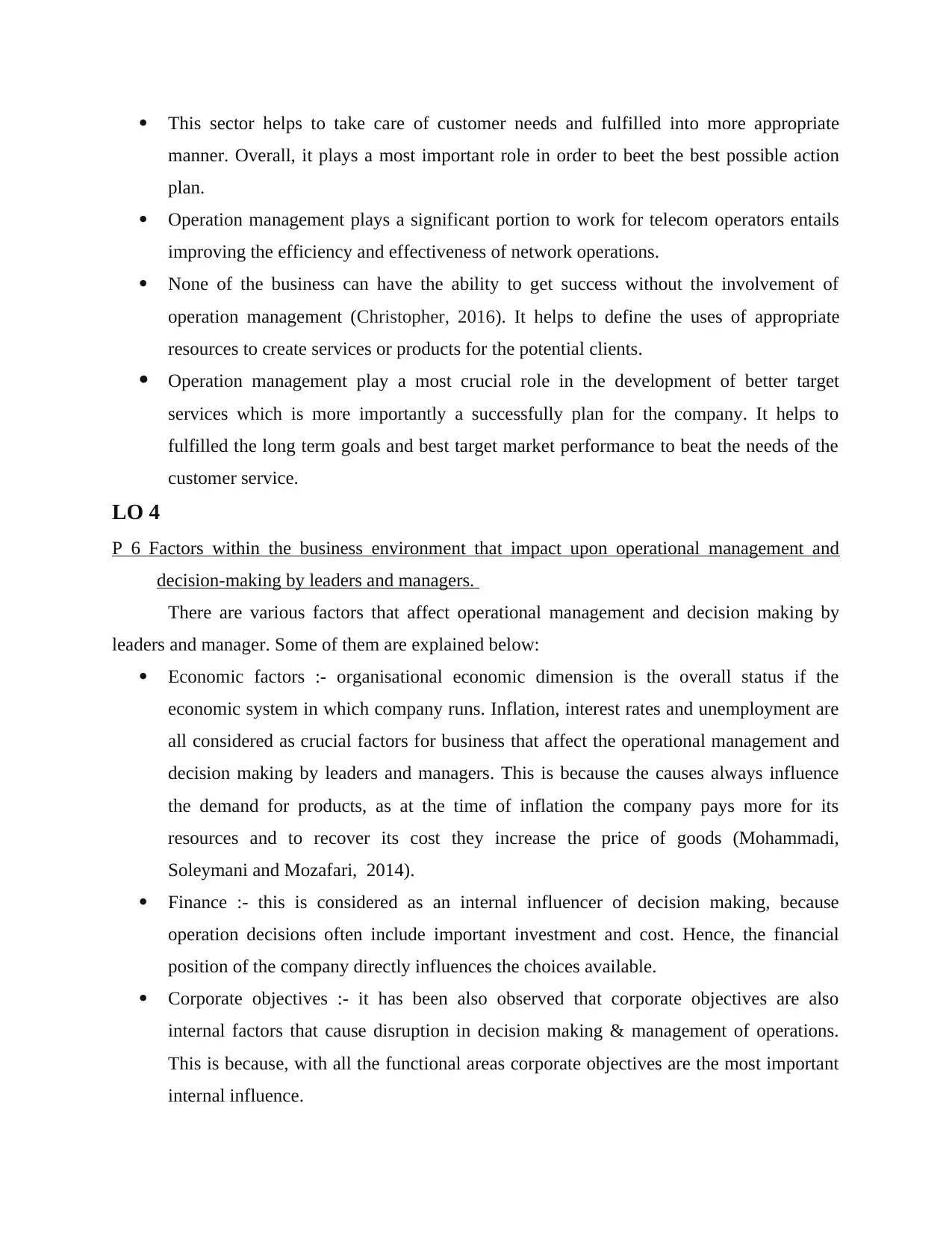
This sector helps to take care of customer needs and fulfilled into more appropriate
manner. Overall, it plays a most important role in order to beet the best possible action
plan.
Operation management plays a significant portion to work for telecom operators entails
improving the efficiency and effectiveness of network operations.
None of the business can have the ability to get success without the involvement of
operation management (Christopher, 2016). It helps to define the uses of appropriate
resources to create services or products for the potential clients.
Operation management play a most crucial role in the development of better target
services which is more importantly a successfully plan for the company. It helps to
fulfilled the long term goals and best target market performance to beat the needs of the
customer service.
LO 4
P 6 Factors within the business environment that impact upon operational management and
decision-making by leaders and managers.
There are various factors that affect operational management and decision making by
leaders and manager. Some of them are explained below:
Economic factors :- organisational economic dimension is the overall status if the
economic system in which company runs. Inflation, interest rates and unemployment are
all considered as crucial factors for business that affect the operational management and
decision making by leaders and managers. This is because the causes always influence
the demand for products, as at the time of inflation the company pays more for its
resources and to recover its cost they increase the price of goods (Mohammadi,
Soleymani and Mozafari, 2014).
Finance :- this is considered as an internal influencer of decision making, because
operation decisions often include important investment and cost. Hence, the financial
position of the company directly influences the choices available.
Corporate objectives :- it has been also observed that corporate objectives are also
internal factors that cause disruption in decision making & management of operations.
This is because, with all the functional areas corporate objectives are the most important
internal influence.
manner. Overall, it plays a most important role in order to beet the best possible action
plan.
Operation management plays a significant portion to work for telecom operators entails
improving the efficiency and effectiveness of network operations.
None of the business can have the ability to get success without the involvement of
operation management (Christopher, 2016). It helps to define the uses of appropriate
resources to create services or products for the potential clients.
Operation management play a most crucial role in the development of better target
services which is more importantly a successfully plan for the company. It helps to
fulfilled the long term goals and best target market performance to beat the needs of the
customer service.
LO 4
P 6 Factors within the business environment that impact upon operational management and
decision-making by leaders and managers.
There are various factors that affect operational management and decision making by
leaders and manager. Some of them are explained below:
Economic factors :- organisational economic dimension is the overall status if the
economic system in which company runs. Inflation, interest rates and unemployment are
all considered as crucial factors for business that affect the operational management and
decision making by leaders and managers. This is because the causes always influence
the demand for products, as at the time of inflation the company pays more for its
resources and to recover its cost they increase the price of goods (Mohammadi,
Soleymani and Mozafari, 2014).
Finance :- this is considered as an internal influencer of decision making, because
operation decisions often include important investment and cost. Hence, the financial
position of the company directly influences the choices available.
Corporate objectives :- it has been also observed that corporate objectives are also
internal factors that cause disruption in decision making & management of operations.
This is because, with all the functional areas corporate objectives are the most important
internal influence.
⊘ This is a preview!⊘
Do you want full access?
Subscribe today to unlock all pages.

Trusted by 1+ million students worldwide
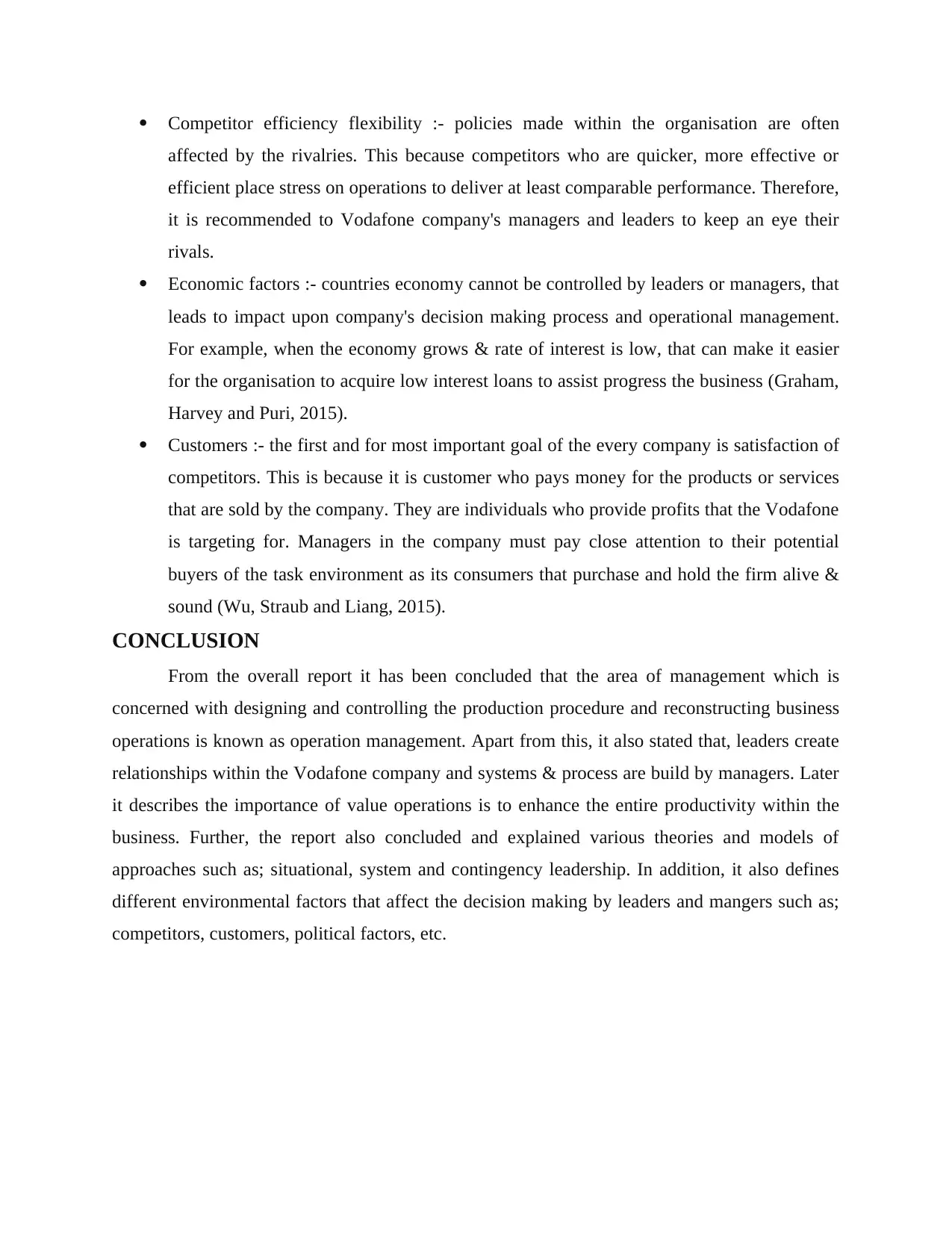
Competitor efficiency flexibility :- policies made within the organisation are often
affected by the rivalries. This because competitors who are quicker, more effective or
efficient place stress on operations to deliver at least comparable performance. Therefore,
it is recommended to Vodafone company's managers and leaders to keep an eye their
rivals.
Economic factors :- countries economy cannot be controlled by leaders or managers, that
leads to impact upon company's decision making process and operational management.
For example, when the economy grows & rate of interest is low, that can make it easier
for the organisation to acquire low interest loans to assist progress the business (Graham,
Harvey and Puri, 2015).
Customers :- the first and for most important goal of the every company is satisfaction of
competitors. This is because it is customer who pays money for the products or services
that are sold by the company. They are individuals who provide profits that the Vodafone
is targeting for. Managers in the company must pay close attention to their potential
buyers of the task environment as its consumers that purchase and hold the firm alive &
sound (Wu, Straub and Liang, 2015).
CONCLUSION
From the overall report it has been concluded that the area of management which is
concerned with designing and controlling the production procedure and reconstructing business
operations is known as operation management. Apart from this, it also stated that, leaders create
relationships within the Vodafone company and systems & process are build by managers. Later
it describes the importance of value operations is to enhance the entire productivity within the
business. Further, the report also concluded and explained various theories and models of
approaches such as; situational, system and contingency leadership. In addition, it also defines
different environmental factors that affect the decision making by leaders and mangers such as;
competitors, customers, political factors, etc.
affected by the rivalries. This because competitors who are quicker, more effective or
efficient place stress on operations to deliver at least comparable performance. Therefore,
it is recommended to Vodafone company's managers and leaders to keep an eye their
rivals.
Economic factors :- countries economy cannot be controlled by leaders or managers, that
leads to impact upon company's decision making process and operational management.
For example, when the economy grows & rate of interest is low, that can make it easier
for the organisation to acquire low interest loans to assist progress the business (Graham,
Harvey and Puri, 2015).
Customers :- the first and for most important goal of the every company is satisfaction of
competitors. This is because it is customer who pays money for the products or services
that are sold by the company. They are individuals who provide profits that the Vodafone
is targeting for. Managers in the company must pay close attention to their potential
buyers of the task environment as its consumers that purchase and hold the firm alive &
sound (Wu, Straub and Liang, 2015).
CONCLUSION
From the overall report it has been concluded that the area of management which is
concerned with designing and controlling the production procedure and reconstructing business
operations is known as operation management. Apart from this, it also stated that, leaders create
relationships within the Vodafone company and systems & process are build by managers. Later
it describes the importance of value operations is to enhance the entire productivity within the
business. Further, the report also concluded and explained various theories and models of
approaches such as; situational, system and contingency leadership. In addition, it also defines
different environmental factors that affect the decision making by leaders and mangers such as;
competitors, customers, political factors, etc.
Paraphrase This Document
Need a fresh take? Get an instant paraphrase of this document with our AI Paraphraser
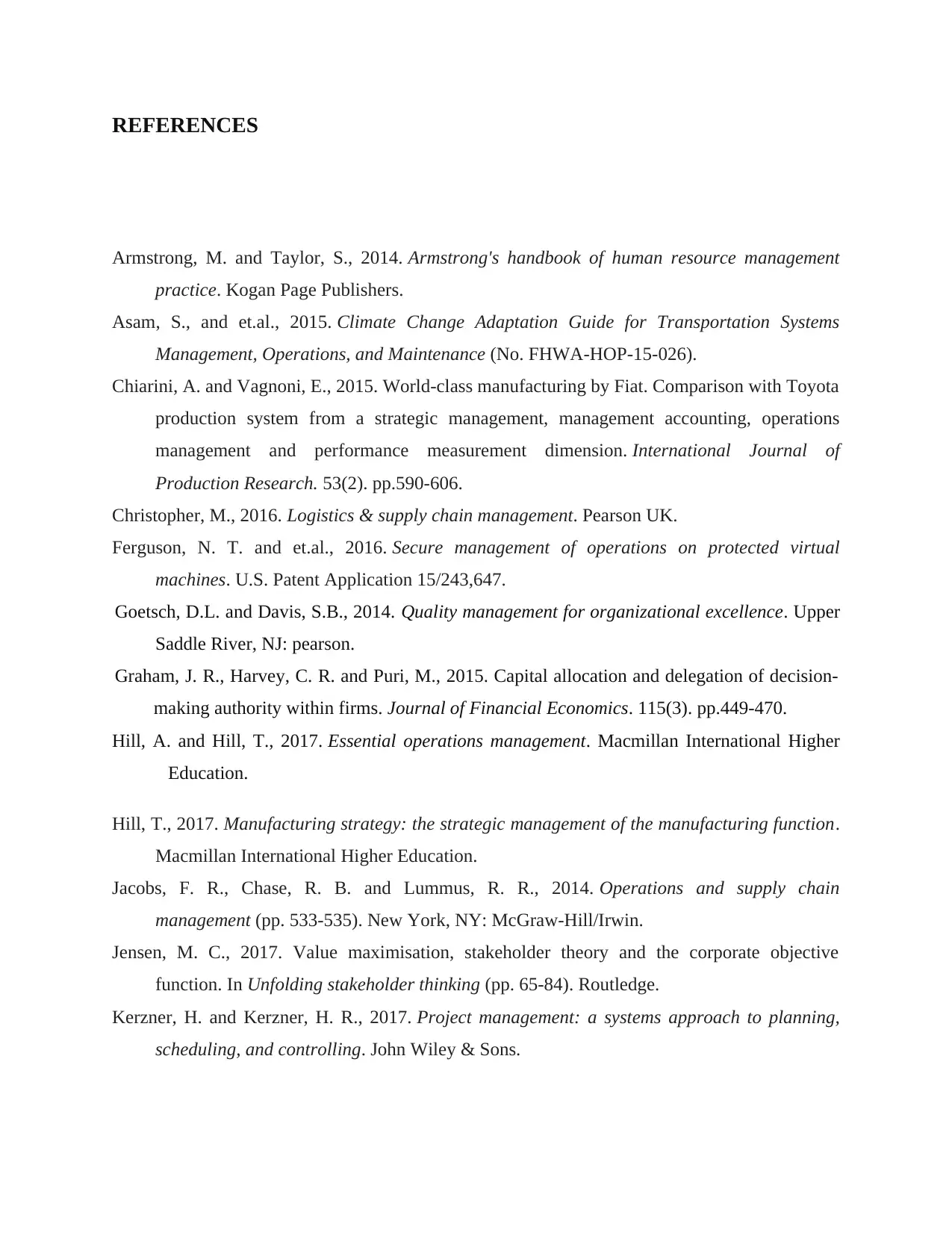
REFERENCES
Armstrong, M. and Taylor, S., 2014. Armstrong's handbook of human resource management
practice. Kogan Page Publishers.
Asam, S., and et.al., 2015. Climate Change Adaptation Guide for Transportation Systems
Management, Operations, and Maintenance (No. FHWA-HOP-15-026).
Chiarini, A. and Vagnoni, E., 2015. World-class manufacturing by Fiat. Comparison with Toyota
production system from a strategic management, management accounting, operations
management and performance measurement dimension. International Journal of
Production Research. 53(2). pp.590-606.
Christopher, M., 2016. Logistics & supply chain management. Pearson UK.
Ferguson, N. T. and et.al., 2016. Secure management of operations on protected virtual
machines. U.S. Patent Application 15/243,647.
Goetsch, D.L. and Davis, S.B., 2014. Quality management for organizational excellence. Upper
Saddle River, NJ: pearson.
Graham, J. R., Harvey, C. R. and Puri, M., 2015. Capital allocation and delegation of decision-
making authority within firms. Journal of Financial Economics. 115(3). pp.449-470.
Hill, A. and Hill, T., 2017. Essential operations management. Macmillan International Higher
Education.
Hill, T., 2017. Manufacturing strategy: the strategic management of the manufacturing function.
Macmillan International Higher Education.
Jacobs, F. R., Chase, R. B. and Lummus, R. R., 2014. Operations and supply chain
management (pp. 533-535). New York, NY: McGraw-Hill/Irwin.
Jensen, M. C., 2017. Value maximisation, stakeholder theory and the corporate objective
function. In Unfolding stakeholder thinking (pp. 65-84). Routledge.
Kerzner, H. and Kerzner, H. R., 2017. Project management: a systems approach to planning,
scheduling, and controlling. John Wiley & Sons.
Armstrong, M. and Taylor, S., 2014. Armstrong's handbook of human resource management
practice. Kogan Page Publishers.
Asam, S., and et.al., 2015. Climate Change Adaptation Guide for Transportation Systems
Management, Operations, and Maintenance (No. FHWA-HOP-15-026).
Chiarini, A. and Vagnoni, E., 2015. World-class manufacturing by Fiat. Comparison with Toyota
production system from a strategic management, management accounting, operations
management and performance measurement dimension. International Journal of
Production Research. 53(2). pp.590-606.
Christopher, M., 2016. Logistics & supply chain management. Pearson UK.
Ferguson, N. T. and et.al., 2016. Secure management of operations on protected virtual
machines. U.S. Patent Application 15/243,647.
Goetsch, D.L. and Davis, S.B., 2014. Quality management for organizational excellence. Upper
Saddle River, NJ: pearson.
Graham, J. R., Harvey, C. R. and Puri, M., 2015. Capital allocation and delegation of decision-
making authority within firms. Journal of Financial Economics. 115(3). pp.449-470.
Hill, A. and Hill, T., 2017. Essential operations management. Macmillan International Higher
Education.
Hill, T., 2017. Manufacturing strategy: the strategic management of the manufacturing function.
Macmillan International Higher Education.
Jacobs, F. R., Chase, R. B. and Lummus, R. R., 2014. Operations and supply chain
management (pp. 533-535). New York, NY: McGraw-Hill/Irwin.
Jensen, M. C., 2017. Value maximisation, stakeholder theory and the corporate objective
function. In Unfolding stakeholder thinking (pp. 65-84). Routledge.
Kerzner, H. and Kerzner, H. R., 2017. Project management: a systems approach to planning,
scheduling, and controlling. John Wiley & Sons.
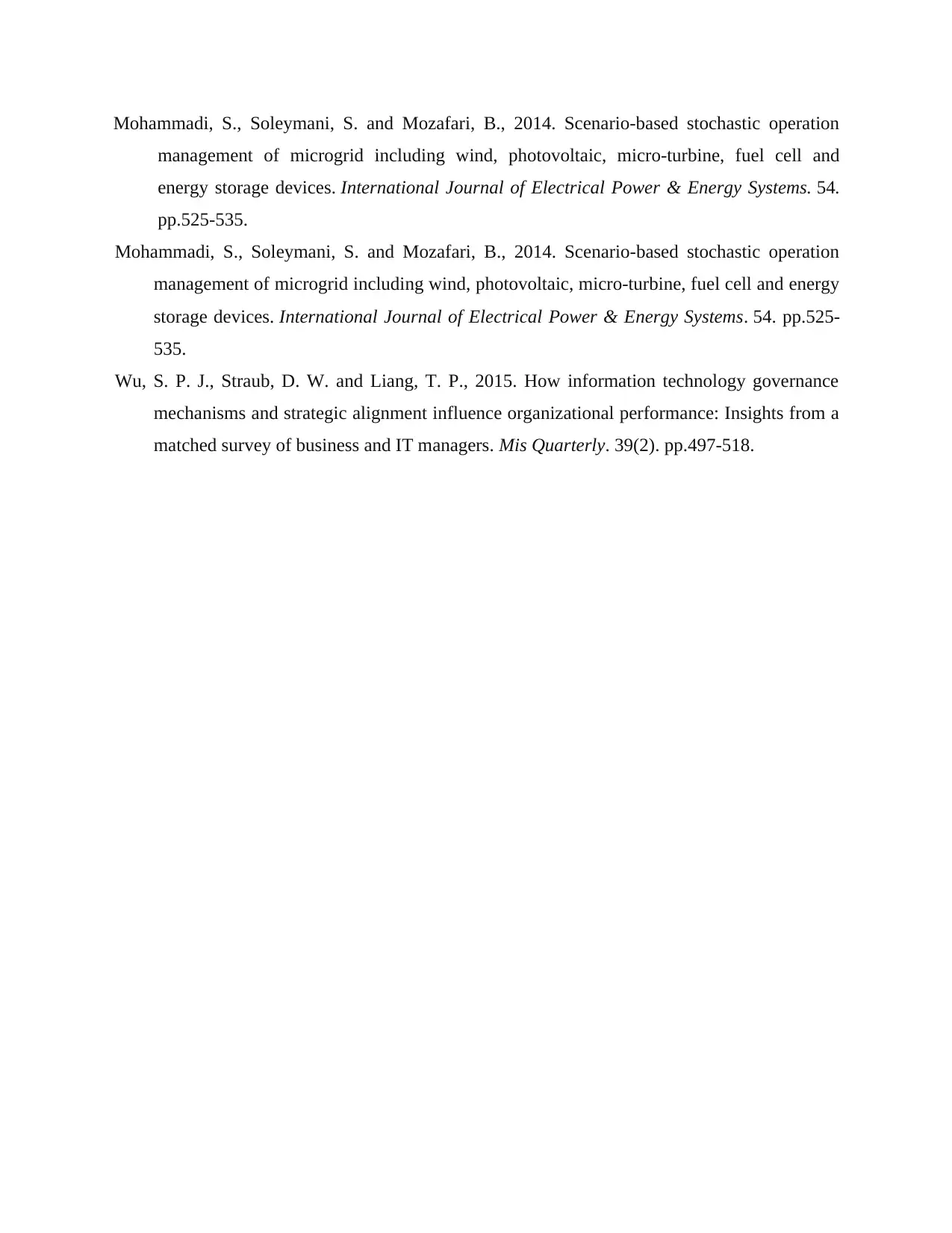
Mohammadi, S., Soleymani, S. and Mozafari, B., 2014. Scenario-based stochastic operation
management of microgrid including wind, photovoltaic, micro-turbine, fuel cell and
energy storage devices. International Journal of Electrical Power & Energy Systems. 54.
pp.525-535.
Mohammadi, S., Soleymani, S. and Mozafari, B., 2014. Scenario-based stochastic operation
management of microgrid including wind, photovoltaic, micro-turbine, fuel cell and energy
storage devices. International Journal of Electrical Power & Energy Systems. 54. pp.525-
535.
Wu, S. P. J., Straub, D. W. and Liang, T. P., 2015. How information technology governance
mechanisms and strategic alignment influence organizational performance: Insights from a
matched survey of business and IT managers. Mis Quarterly. 39(2). pp.497-518.
management of microgrid including wind, photovoltaic, micro-turbine, fuel cell and
energy storage devices. International Journal of Electrical Power & Energy Systems. 54.
pp.525-535.
Mohammadi, S., Soleymani, S. and Mozafari, B., 2014. Scenario-based stochastic operation
management of microgrid including wind, photovoltaic, micro-turbine, fuel cell and energy
storage devices. International Journal of Electrical Power & Energy Systems. 54. pp.525-
535.
Wu, S. P. J., Straub, D. W. and Liang, T. P., 2015. How information technology governance
mechanisms and strategic alignment influence organizational performance: Insights from a
matched survey of business and IT managers. Mis Quarterly. 39(2). pp.497-518.
⊘ This is a preview!⊘
Do you want full access?
Subscribe today to unlock all pages.

Trusted by 1+ million students worldwide
1 out of 12
Related Documents
Your All-in-One AI-Powered Toolkit for Academic Success.
+13062052269
info@desklib.com
Available 24*7 on WhatsApp / Email
![[object Object]](/_next/static/media/star-bottom.7253800d.svg)
Unlock your academic potential
Copyright © 2020–2026 A2Z Services. All Rights Reserved. Developed and managed by ZUCOL.



